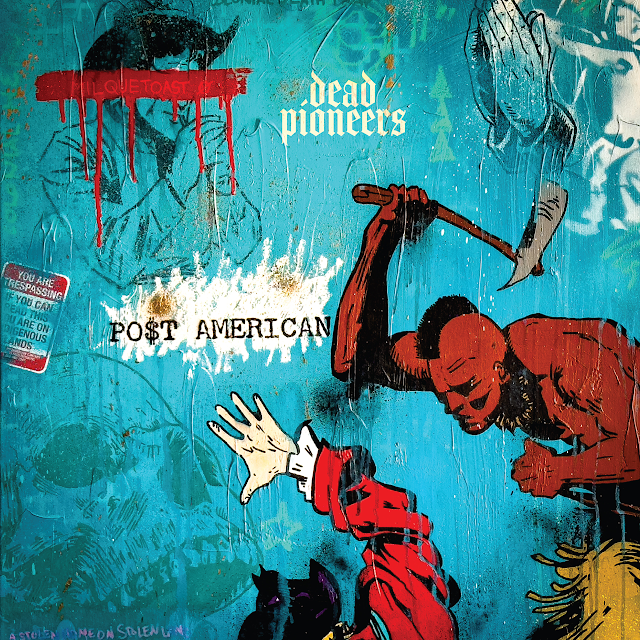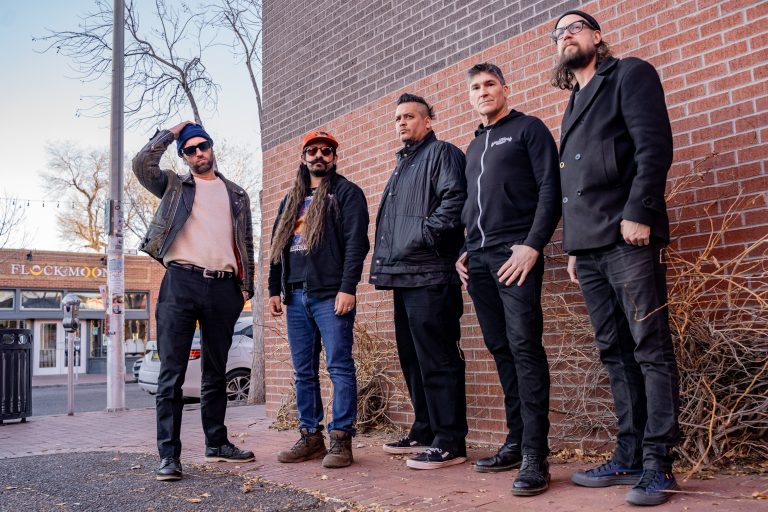Dead Pioneers fuse punk, poetry, Indigenous politics and protest

By Cannon Taylor [Excerpt]
The album “PO$T AMERICAN” begins with the sound of Gregg Deal thumping an animal-skinned hand drum. He opens his mouth and belts out the American Indian Movement’s intertribal song of protest — more specifically, a version performed by the band Blackfire.
It’s the most melodic vocal delivery you’ll hear from Deal, who tends to blend spoken word poetry with incensed, punk zeal on most Dead Pioneers tracks. Before recording “A.I.M.,” Deal hadn’t sung in that way in 20 years. His bandmates, apparently, were gobsmacked when they realized he could carry a tune.
Deal’s singing is soon overtaken by an ominous, fuzzy distortion. The sound was accomplished by connecting the drum’s contact mic to the War Pony distortion pedal created by NativeAudio. The track goes silent as actor Michael Grey-eyes recites a quote from John Trudell’s character in “Thunderheart”: “Sometimes, they have to kill us. They have to kill us because they can’t break our spirit.”
Then, the sound erupts into a different kind of protest music: the irate guitar and pounding drums of punk rock.
Dead Pioneers began as an outgrowth of Deal’s 2022 performance piece “The Punk Pan-Indian Romantic Comedy,” a memoir-style talk about his upbringing and musical influences. Although Dead Pioneers is Deal’s first band, it’s far from his first artistic endeavor. Over a two-decade visual art career, his work has appeared everywhere from Colorado to Washington, D.C.
“Take Back the Power,” his 80-foot-tall mural painted in downtown Colorado Springs, depicts Deal’s eldest child, Sage, in an Interrupters t-shirt, with a red handprint painted over their mouth in recognition of Missing and Murdered Indigenous Relatives.
“It was about representation in the easiest way possible. Like, Sage isn’t wearing regalia or feathers or beadwork. Sage’s hair is down, not bound up, and they’re wearing their favorite t-shirt for their favorite band,” Deal said. “You can see this in Dead Pioneers, because this is something I’m doing there as well … representing Indigeneity without pandering my own cultural wares along the way.”
Deal’s first-ever performance piece, “The Last American Indian On Earth,” involved him donning culturally inaccurate Native American garb and going out in public to document reactions.
Deal writes about one of the encounters in Dead Pioneers’ first song, “Bad Indian,” which was written and performed as the conclusion of “The Punk Pan-Indian Romantic Comedy.” A woman begged him to tell her his “real” Native American name. Deal provides a few contrived examples: “Grayskull” (a He-Man reference) and “Walking Eagle” (based on a joke about how the only time an eagle walks is when it really has to use the restroom).
Bandmate Abe Brennan, a guitarist, has been in bands that have opened for the Descendants, Soundgarden and Nirvana. “I’m surrounded by musicians that know exactly what they’re doing,” Deal said. “They can hear things I can’t, and they can push me.”
Deal’s national art career also brings a lot to the table. Dead Pioneers were recruited to open for Pearl Jam on tour; Pearl Jam bassist Jeff Ament had purchased art work from Deal before, and they became acquaintances. In 2024, Ament recruited Dead Pioneers to headline the Big Sandy Pig Roast, a charity punk fest in his hometown in Montana. Ironically, the mascot of Big Sandy High School is the Pioneers.
The cover art for “PO$T AMERICAN” depicts a Native American cutting down a white settler. The image comes from “The Others,” Deal’s series of re-appropriated comic book depictions of Native Americans from the 1940s and ‘50s. For the exhibit, Deal added speech bubbles with lyrics from punk songs. The image on the cover was originally paired with a lyric from D.O.A.’s “That’s Progress”: “You’re evicted, time to leave / Don’t matter if your family’s lived here 30 years.”
The back cover and lyric sheet for the record were also designed by Deal and feature a plethora of Easter eggs, including cameos by actor Will Sampson and Deal’s mentor, James Luna. The lyric sheet depicts a row of books, providing listeners with suggested reading material, from “How to Be an Antiracist” by Ibram X. Kendi to a biography of Che Guevara. In an age where many labels lazily toss a black LP into a floppy cardboard sleeve, the design of Dead Pioneers’ second album is lovingly intentional, designed by a true discophile.
Growing up in Park City, home of the Sundance Film Festival, movies were just as important as music in Deal’s family. The influence shows in “PO$T AMERICAN.” Quotes from films like “Smoke Signals” and “The Outlaw Josey Wales” are sprinkled throughout the album, and there’s even a reference to Lily Gladstone’s Oscars snub in the humorously titled “My Spirit Animal Ate Your Spirit Animal.”
One track is an ode to Chief Bromden from “One Flew Over the Cuckoo’s Nest.” The character pretends to be deaf and mute for much of the film — the stereotype of a silent, stoic Native — but reveals he can speak when offered a stick of gum. “Who would have known that him saying, ‘Juicy Fruit,’ would have changed the face of Native people in cinema from that point on?” Deal enthused. “It’s this incredible moment in cinema, because you just took that monolith, and you just brought him into the contemporary world.”

Lee Tesche Joshua Rivera Gregg Deal Abe Brennan and Shane Zweygardt of Dead Pioneers
Deal’s favorite genre is the Western. He grew up on spaghetti Westerns, thinks “Unforgiven” is a marvel of cinema and can even get a little enjoyment out of “The Magnificent Seven.” “The whole cowboy and Indian narrative, I resent significantly. But I think one of the weird things about westward expansion is nobody realizes that poor whites were being sacrificed for that expansion,” Deal said. “There’s some interesting history there that I think would benefit a lot of Americans if they actually paid attention to it and not got so caught up in the romantic, nationalistic narrative of it — this sort of ‘land of opportunity’ thing. It was a terrible time.”
The second single on “PO$T AMERICAN,” “Mythical Cowboys,” addresses how many John Wayne and Kevin Costner films romanticize westward expansion and inaccurately or negatively portray Native Americans. “We wrote that song, and we recorded it, and that night, I had a dream that Kevin Costner was really upset with me, and he wanted to give me a talking-to,” Deal laughed.
Later, when BBC Radio 1 DJ Daniel P. Carter (who is close friends with the founders of Hassle Records, Dead Pioneers’ UK-based label) played several Dead Pioneers songs on-air, a producer removed “Mythical Cowboys” from the track list. According to Deal, when Carter asked the producer for an explanation, she said that “she didn’t think it was fair because Kevin Costner wasn’t in a position to respond to the diss.” [TTT editor’s note: When I was a reader for TriStar Pictures, I recommended turning down “Dances With Wolves” because of its absurd ‘white savior’ story line.]
“We’re past the point of non-Native people telling our stories,” Deal asserted. “You either need to invite a Native person to help inform those stories, or you just need to back away and let us tell the stories ourselves.”
Beyond the treasure trove of film references, “PO$T AMERICAN” covers a lot of lyrical and instrumental ground. “Pit Song” is a pummeling tribute to losing oneself at a punk show, and the self-titled “Dead Pioneers” keeps up the fast-paced energy with a hardcore bass groove and a reversal of the “Ten Little Indians” rhyme. “Love Language” is a takedown of toxic masculinity, backed up by Petrol Girls’ Ren Aldridge, whose English-accented enunciation infuses sarcastic venom into every line.
In “The Caucasity,” Deal recalls being interrupted while speaking at a university by a student who inquired, “Why do you spend so much time complaining and not putting your energy into actually helping your people?” Over a bouncy bassline and scratching, skeletal guitar, Deal answers the question with outrage and a dash of humor, his voice filling with spite that nearly boils over by the end of the five-minute track.
In the moment, Deal asked the student whether he had ever learned about the 19-month occupation of Alcatraz Island by Native Americans, or the 1972 sit-in at the Bureau of Indian Affairs in Washington, D.C. He hadn’t. “As you’re sitting here saying that I’m complaining, I’m teaching you things that you don’t even know, and you’re not asking yourself why you don’t know them,” Deal said. “The omission of information is immediately telling you who’s important, and who isn’t.”
Many of the more somber tracks pull from Deal’s parental perspective. The piano-backed “Bloodletting Carnival” is inspired by the traumatizing pressures put on children in America. “One of the comments I saw during the Palestine protests at colleges was that they couldn’t believe how well these kids could build barricades, without realizing that this is the generation of kids that have been building barricades their entire life in preparation for school shootings,” Deal observed.
“Fire and Ash,” with its walking, synthetic bassline, pensive acoustic guitar and choked-up vocals, stems from Deal’s reaction to the death of non-binary high schooler Nex Benedict in 2024, and his own feelings as the parent of a non-binary child. “White Whine” pulls from Deal’s own childhood as he teasingly clarifies that he doesn’t hate white people. The lyrics are inspired by a friend of a friend’s response to being invited to a Dead Pioneers concert: “I don’t feel like going to your show and feeling bad for being a white guy.” Deal then explains that his intent is not to make people feel guilty for immutable characteristics like their skin color or heritage, but to denounce white supremacy.
Growing up on the receiving end of racial bias from authority figures like his gym teacher, Deal thought that he was, somehow, a problem — a perception he didn’t shake for a long time. “A lot of what I do is trying to write something that I would have wanted to hear when I was a kid,” Deal explained. “I’m not as concerned about white folks’ feelings being hurt as I am about the Indigenous or Black or brown child feeling like they’re a problem.”
Dead Pioneers’ second album, “PO$T AMERICAN,” releases April 11 through Hassle Records. Music video here: https://www.youtube.com/watch?v=EibRlLorFTY Podcast interview with Gregg Deal: https://www.youtube.com/watch?v=oKFNpcCDjq0
